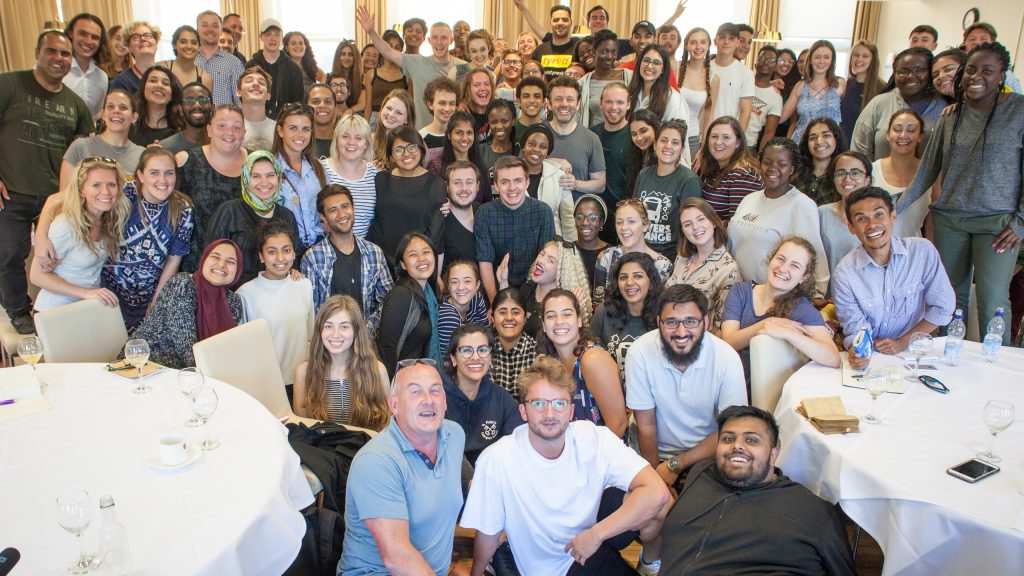Be the Change

A Collective Journey into the UK’s social identity
On the 21st of June 2018 part of the AKOU team set off to Liverpool to join the debut of the Drivers for Change (DfC) programme. The incentive behind DfC is to take 100 young people on a journey around the country over the course of two weeks to introduce them to examples of successful social enterprises and innovations. The journey focuses on visiting parts of the UK where economic struggle and deprivation have become the bedrock of local communities in the past decades.
The DfC journey is inspired by Jagriti Yatra, a monumental train journey through India, where 500 young people ride the rails for two weeks straight, visiting different communities to see what they can learn from one another. The participants are then expected to take these learnings back with them in order to apply them to help their own communities.

The first UK trial of this journey began in the north (Liverpool) and ended in the south of the country (London). The young people that filled the DfC coaches were representing pockets of England, Scotland and Wales. The British Council, one of the partners supporting the trip, had also invited participants from countries such as Pakistan, Brazil, Vietnam and Egypt. Each participant was there because they wanted to instigate transformative social change in one way or another. Some were already supporting their community through an existing project or a social enterprise, others had ideas of how to improve or better support the community they belonged to, they were looking to develop.
The Value of Alternative Social Infrastructures
AKOU was invited as the technical partner to provide the programme with a customised platform that allowed each participant to build a network map, showcasing the type of relationships they’d built up over the course of the journey. DfC felt it was important to be able to show participants about how important a resource social capital. By understanding new connections made on the trip, the participants could see the impact they would be able to make on each other’s lives. Along with supporting the impact measurement side of the DfC program, there were a number of other reasons why this expedition was also of importance for AKOU and influential to our own journey going forward as a company.
I’ve become much more confident in connecting with people since the trip – shouting out for a coffee / help advice.
A participant from Drivers for Change
One of the founding principles of AKOU is based on the belief that both, decision makers and communities themselves need to measure success and social value in new ways. Since we began building our specialised platforms in 2014 we have been collecting new data and co-creating interactive maps that allow communities to map and measure social impact, networks of exchange and social capital. AKOU has worked as part of regeneration schemes in highly deprived areas of London mapping impactful community groups, resourceful grassroots organisations and proactive individuals. We collect data that demonstrates the value of alternative social infrastructures that support local residents when mainstream economic structures fail to include them and meet their needs.
The Drivers for Change program shone a light on some of the UK’s most impressive grassroots achievements and celebrated them. It also revealed that behind the common perception that the UK is fiercely progressive when it comes to welfare and equal opportunities, there are shocking levels of deprivation in many parts of the country. With few employment opportunities available, lacking social mobility and little confidence in what is possible, these communities are still yet to recover from having the industries that powered their neighbourhoods ripped from their core.
A New Currency
Were taken to visit a variety of social enterprises at each city and spoke to those who are doing the work; for themselves, for their home, for their community and for a brighter future in the area they lived in. It was energising to be in the presence of such hope, such humble pride and such determination. It was inspiring to be shown and reminded that even without money, there is still a way of moving things forward. The projects that we visited were encouraging examples of where to start when trying to instigate place-based change. They were uplifting demonstrations of what these first steps might look like when trying to transform life experiences and opportunities in areas so entrenched in poverty and dissolution that it feels like it has become a whole community’s DNA.

In a unique way, this journey gave us a whole new understanding of the challenges this country faces and how some have taken it upon themselves to make transformative change happen. The general theme that seemed to be sprouting from the ground like urban flower bombs in each city we visited, was a shared belief that to measure value in new ways the first thing to address is the local perception of what is actually possible.
The first step towards localised change seemed to be for a group of local residents to take a few steps back and assess what resources were underused but were within arms reach for the community if they mobilised themselves correctly. And this is exactly what we promote at AKOU. Instead of focusing on what a place is lacking, we focus on measuring the value and wealth of what is already there, creating a new currency. Social value exchange, local connections and turning underused resources into assets are the foundations of shaping a new social currency, a currency that has the potential to buy a place new hope.
READ about Chuck’s Drivers for Change Edinburgh experience here.





